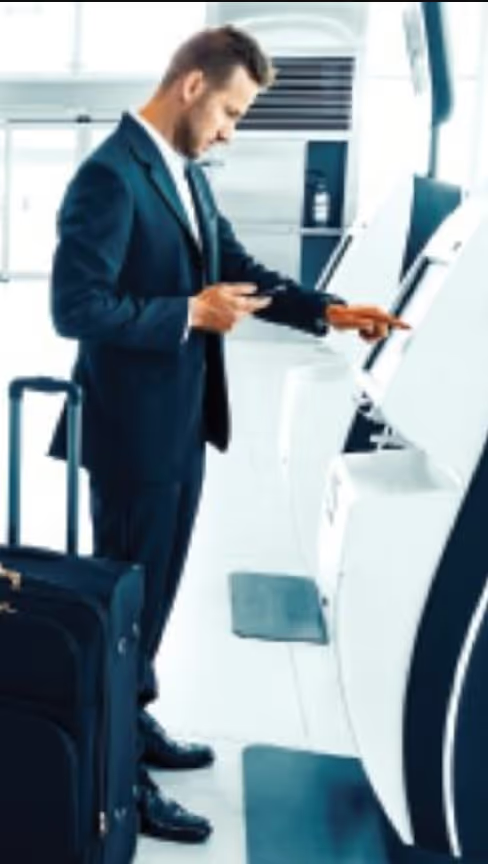Historically, hotels have been slow to embrace self-service kiosks. It’s been hard for hoteliers to see the benefits of replacing the human touch with a glorified ATM. Imagine that instead of a front desk, your hotel greets guests with a pair (or more) of socially distanced kiosks featuring large, interactive touch screens and clear workflows that make check-in a breeze.
I can hear you asking, “Why would a hotel bother putting in kiosks, and not just move to mobile check-in and mobile key?”
Right now, most hotels aren’t ready for mobile key. Several brands have made forays into mandating it. And one major U.S. brand family is nearing universal adoption, but the vast majority of hotels don’t have a mobile key solution.
There are a few challenges preventing the majority of hotels from implementing mobile key:
Hardware costs: This issue tops the list for many hotels. Getting the right technology on the door isn’t cheap, especially for owners with 7- to 10-year-old locks that are still working. And even with locks that support mobilekeys in place, hotels struggle to implement the software that will allow guests to use them. There are development concerns with building an app or adding the key system to an existing app. Interfacing with the property management system is a big hurdle in terms of both short- and long-term costs. Plus, many property management systems only have a handful of lock system partners. So even if your PMS does work with your lock systems, you may not have the correct interface for standard check ins. Remote check-in with mobile key requires a higher level of orchestration between the PMS, key system, app and door locks. All of this complexity adds up.
Exacerbating this issue is the fractured market for guest devices and underlying hardware: near field contact (NFC) versus Bluetooth low energy (BLE), Android vs. Apple, Apple Watch vs. FitBit, current model phone vs. a five-year old model. Add in lock battery issues and coverage problems, and the best mobile key program in the world can have problems with guest experience consistency.
Adoption rates: A good adoption rate to date has been 2% to 4% of check-ins using mobile check-in and mobile key. It’s a hard call for many owners to invest in these technologies when so few guests use them. Beyond that, it’s only recently that mobile keys have become a motivating factor for guests making a buying decision. The pundits tell us this is all about to change, but hotels are still holding back.
A number of hospitality spectrum partners are promoting contactless check-in, but they’re often only one small part of the program, like payments. They lack the rest of the components for a true automated, contactless, check-in experience.
It’s time for a Hospitality Kiosk Revolution!
We’ve been trained to use kiosks at train stations, grocery stores, airports and even at self-service beer bars.
I know, I know -- why would we put in kiosks when people still have to touch them? It’s easier to clean a kiosk, even after each guest, than a front desk. There are also self-sanitizing surfaces and UV lights to help keep kiosks clean at all times.
Over and over again we are seeing that contactless check-in is the way of the future. But I haven’t seen a practical solution that allows guests to enter the room without touching a door handle. So we need to stop calling it a contactless check-in. It’s really about the need for less contact. Plus, as mentioned above, hotels aren’t ready to send guests straight to their rooms, and many are still working on technology like mobile key.
The coming months will see a ton of investment in technology and other capital not only to keep hotels clean, but to reassure guests that they are clean. Frankly, I’m not sure how many of these items are needed long term. Nor have I seen data regarding guest demand for a straight-to-room option as part of their buying decision. This is where I see the kiosk filling many needed roles and being a great long-term investment.
Overcoming the Challenges
One of the biggest kiosk failures in my experience is the key making process. Magazines of keys often get misaligned or stuck. For new kiosks, we need to borrow technology from major transit systems, like the Metro in Washington, DC. Thousands of people reload their Metro cards without incident. CitizenM hotels use kiosks that let guests make their own keys. Their smooth-working system is connected locally, which removes many of problems with mobile key use. In many cases the kiosk program can call the key-making system like a local desk agent would.
Right now, some kiosks cost upward of $20,000 a piece, plus installation. But there are programs in beta testing that run less than $10,000. I hope we’ll soon see a kiosk under $5,000.
I believe kiosks as a long-term strategy make sense. Even as pandemic concerns subside, the kiosk will be a great tool to help when staffing is tight, or when the new normal needs staffing to be near zero. Kiosks can upsell. Kiosks can book ancillary services, shuttles, restaurant reservations and deliver myriad services we haven’t even considered.
The world has changed, and technology has led the way to keeping businesses open. Hotels have been flirting with kiosks for decades. It’s time to leverage this opportunity and give kiosks a real chance to make a difference.
















 Skip to Main Content
Skip to Main Content